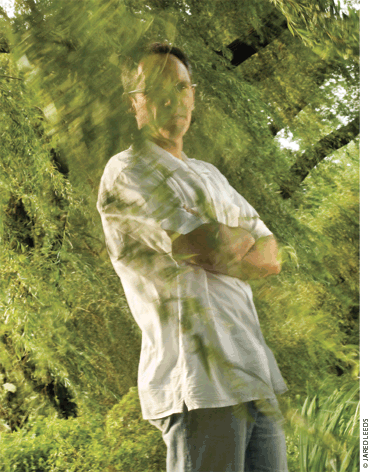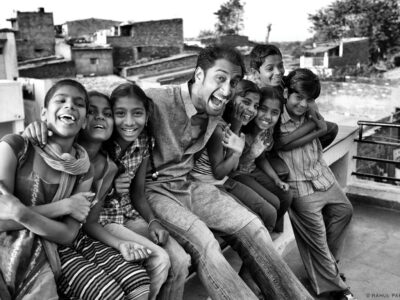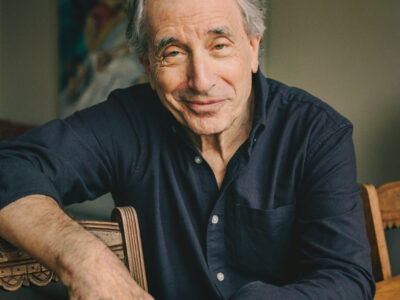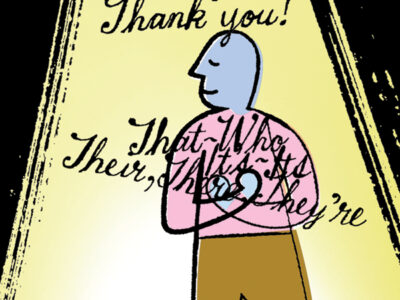
Acclaimed composer Osvaldo Golijov Gr’91 doesn’t mind being famous, but he’d rather talk about music than himself—or better yet, write it.
By Karen Rile | Photo by Jared Leeds
The mood backstage at the Rose Theater was euphoric. Soloists, choristers, and well-wishers congratulated one another and sipped champagne. The evening’s performance of Osvaldo Golijov Gr’91’s nuevo oratorio La Pasión Según San Marcos marked the conclusion of a month-long Lincoln Center festival featuring works by the 46-year-old Argentinean composer of earthy, eclectic—and uncharacteristically popular—classical music.
Earlier that month Lincoln Center audiences had heard performances of Golijov’s one-act opera Ainadamar (“Fountain of Tears,” 2003), which is based on the life of the Spanish playwright/poet Federico García Lorca, as well as chamber works played by the Kronos and St. Lawrence quartets, and Ayre(2004), a 40-minute song cycle with settings of traditional Jewish, Arabic, and Christian folk melodies performed by soprano Dawn Upshaw with an instrumental ensemble called The Andalucian Dogs.
The perfect piece to end the festival, La Pasión is a typically complicated Golijovian production which was originally commissioned by Bach choral specialist Helmuth Rilling in 2000. Based on the New Testament text, the work is sung in Spanish, Latin, and Aramaic, and incorporates a mélange of musical idioms, ranging from Brazilian samba and Afro-Cuban drumming to Gregorian chant. La Pasión is world music in the literal sense. Onstage that night were flamenco and classical vocalists, several choruses, an Afro-Cuban percussion ensemble, a berimbau soloist, a capoeira dancer, and a chamber ensemble from the Atlanta Symphony Orchestra led by renowned conductor Robert Spano. The hall was packed with classical music cognoscenti, and more: David Bowie was spotted in the audience; the women seated beside me had flown in especially from Venezuela. There was a 10-minute standing ovation.
To be the subject of a major festival at such a relatively tender age is an astonishing achievement, but the honor came as no surprise to fans of Osvaldo Golijov (pronounced “golixof”), whose career has blossomed steadily since he graduated from the Penn Ph.D. program in 1991. Golijov enjoys the kind of success undreamed of by most classical composers: His works are staged by superstar director Peter Sellars, sung by top divas like Dawn Upshaw, performed by Yo Yo Ma, recorded by EMI and Deutsche Grammophon, and—perhaps the ultimate litmus test for a serious artist entering the popular imagination—tracks from several of his albums can be downloaded from the iTunes Music Store. He’s currently composing a full-length commission for the Metropolitan Opera and writing a film score for Francis Ford Coppolla, and he was named 2006 “Composer of the Year” by Musical America, the classical-music industry’s bible. In a word, Golijov is hot.
So where amid this festive backstage Lincoln Center crowd was the celebrated composer? I pressed my way through the mob with a handful of magazine clippings and CD liner photos to help me recognize Golijov, whom I’d interviewed several times by phone and e-mail. Finally, I spotted him. He was not, as one might expect, basking in adulation from his adoring fans. He was around the corner, out of the limelight, chatting with his rabbi.
After our brief introduction (Golijov politely signed my copy of his Grammy-nominated double CD set of Pasión) he apologized, “Here is my rabbi’s family, who came all the way tonight from Brookline, Massachusetts,” and turned his attention back to them. This is a man who knows in his heart that it’s more important to honor his rabbi, and his rabbi’s wife and kids, than to mingle with potential patrons, or the press.
Slender and bespectacled, with modest body language and a soft voice, Osvaldo Golijov looks more like a college professor than a cultural luminary. (In fact, he serves on the composition faculties of Holy Cross College, Boston Conservatory, and Tanglewood Music Center.) He lives in Newton, a suburb of Boston, with his wife Sylvia, a music therapist who works with autistic children, and their own three kids, the oldest of whom, Talia, a student at George Washington University, works part-time as her father’s office manager.
Whereas other successful composers actively court media attention, and even hire publicists to increase their visibility, Golijov avoids the press—and Talia assiduously protects his precious writing time.
It takes months of requests before Golijov finally agrees to let me visit him at his Brookline, Massachusetts studio (and only after I assured him I would not be making a special trip. I’d be in the neighborhood anyway). His studio, in a tree-lined residential section of the city, is painted in strong colors, oranges, that evoke the striking cultural mélange that informs his works. Despite his initial reluctance about the interview, Golijov is welcoming and articulate. While we talk, his 11-year-old daughter, Eliana, whose artwork decorates the walls, half-listens and occasionally contributes to the conversation as she writes a short story on her computer in the next room.
“The beauty of composing is that no one pays attention to you,” says Golijov. “Success is wonderful; of course, it’s what we all aspire to. Success allows me to continue my work, and gives me opportunities for larger, more ambitious projects, such as my Metropolitan Opera commission. So I don’t mean to complain. But, you see, paradoxically, success is not ideal for the life of a composer. I’m still learning and adjusting to the problems of fame. I’m figuring out how to continue working under these new circumstances.”
Osvaldo Golijov was born in 1960 in La Plata, Argentina, a culturally diverse college town 40 miles from Buenos Aires, to a pair of university professors—an orthopedic surgeon and a piano teacher. He grew up Jewish, religious, in a Catholic country, and spent much of his childhood at the synagogue. “I basically lived there,” he says, acknowledging the sense of isolation he often felt. Ethnically Eastern European and culturally Latin American, he is of both the old world and new, an outsider and insider, a doer and observer. One way of looking at it is: You couldn’t ask for finer ingredients in the recipe for a groundbreaking millennial composer.
As a boy, Golijov was intelligent, studious, and musically gifted. His mother, who gave up her performing career to become a teacher and to raise her four children, pushed him to excel and taught him what he calls “the happiness of studying.” She also trained him to be a classical pianist, so that by age 10 he was well-schooled in the works of Bach, Mozart, Beethoven, and Schubert. Then, his forward-thinking mother decided it was time to immerse young Osvaldo in the newest music of the day. One evening in 1970, she took him to a hotel café in their hometown to hear Astor Piazzolla, the legendary Argentinean composer and bandoneón player whose then-controversial nuevo tango incorporated elements of jazz and classical music with the traditional Argentine dance form.
“That was a defining moment for me. I had never heard a living composer play his own music,” says Golijov, glancing in the direction of his young daughter—about the same age as he was then. “And hearing Piazzolla for the first time was the great revelation of my life. I could see right away that his counterpoint was as intricate as Bach’s. Yet I could also make an immediate, startling connection between his musical vernacular and the way people talk on the streets of Argentina. Listening to his phrasing, I remember thinking, I understand. I know where that accent comes from!” That night in the hotel café transformed Golijov from a performer to a composer.
Golijov attended many performances by Piazzolla throughout his childhood, but was too shy to approach his hero, whose feisty personality could not have been more different than his own (Piazzolla was known to break into fisticuffs during arguments over his music.) Likewise, Piazzolla was never cognizant of the existence of his musical heir apparent, for Golijov was only just beginning to come into his own voice at the time of the elder composer’s death.
“I never spoke to him, but I’ve dreamed of him many times,” Golijov says. “In 1991, after Piazzolla suffered his second stroke, I composed the piece Last Round as an imaginary opportunity for his spirit to get up and fight one more time.” Last Round, whose title is borrowed from a short story on boxing by Julio Cortazar, is scored for two string quartets and double bass, and was officially premiered in England in 1996. It appears on Golijov’s 2002 album Yiddishbbuk (EMI), performed by the St. Lawrence and Ying quartets. But its second (and most Piazzolla-like movement) was drafted while Gollijov was still in graduate school at Penn, and first performed at the Painted Bride Art Center by a group of students from the Curtis Institute shortly before Piazzolla’s death.
“After Piazzolla died in 1992, I dreamed that he was listening to Last Round,” says Golijov with wistful irony. “And he said to me, ‘It’s good, Osvaldo. But it’s too late.’”
As Golijov reached adolescence, his world began to crumble. During the infamous “Dirty War” that consumed Argentina from 1976-1983, thousands of artists, intellectuals, and dissidents were “disappeared,” including some of Golijov’s friends and neighbors. “It was impossible to live there and not know someone who had been kidnapped or tortured. My parents were politically liberal and considered moving to Israel or Australia, but in the end it was I who left. I felt that, as a Jew, I would always be a second-class citizen in Argentina. This was not my war, and I wasn’t ready to risk my life in a battle that wasn’t my own.”
Golijov spent the next three years studying composition at the Jerusalem Rubin Academy. His mentor there was Russian-Jewish composer Mark Kopytman, whose compositions make frequent use of elements of Jewish folklore. Kopytman had been a visiting professor of music at Penn in the early 1980s, and encouraged Golijov to apply to the University’s Ph.D. program in composition. Golijov arrived in Philadelphia in 1986. He was quickly taken under the wing of avant-garde composer George Crumb, Annenberg Emeritus Professor in the Humanities, whose idiosyncratic, cerebral works present frequent juxtapositions of Western and Eastern musical styles, and who shares Golijov’s fascination with García Lorca.
“I was very lucky to have the opportunity to study with George Crumb,” says Golijov. “Although his music and mine couldn’t be more different, his teaching completely transformed me. He taught me a lot about compositional technique and orchestration. And he encouraged me to find my own voice. He is part of the essence of who I am as a composer.”
In the beginning, there was a communication gap of comic proportions. “Mr. Crumb, of course, has a heavy West Virginia accent, and I spoke with my own heavy accent. For a long time, we couldn’t understand a word each other said. Still, I learned, if not always in a conscious, deliberate way. I listened as he played Chopin in his office in between students. I absorbed everything I watched him do. This was the greatest thing that happened to me at Penn. It’s like old Hasidic legend, where the student decides to learn by watching the rabbi tie his shoes. Everything the great man does, you watch and you learn something.”
Moving to Philadelphia from Jerusalem was a huge culture shock for Golijov. “Argentina is essentially a third-world country, and Israel is a small place,” he says. “I was certainly not prepared. This was my first time in the U.S., and every experience was utterly strange to me: On the first night, we got lost trying to drive from JFK airport to Philadelphia and couldn’t find our way back to the highway. It was hopeless—we drove in circles, and then ended up exhausted, sleeping in the car, in a McDonald’s parking lot.
“When we arrived in West Philadelphia, one of the first things I noticed was people drinking beer from bottles wrapped in brown paper bags. I thought, this is exactly like a Starsky and Hutch episode. I’d believed that what I’d seen on TV was just a Hollywood exaggeration, but it was real.
“At the end of my first semester, there was a music-department Christmas party sponsored by the then-chairman, Eugene Wolf. I’d never seen anything like it, and I kept thinking, this is exactly like a Woody Allen movie. Like Hannah and her Sisters.
“In Argentina, if you go to a dinner party you can get stuck for the entire evening sitting at the same table with the same people. At the Penn music-department party, I could see right away that the expectation was that you mingle, talk to one person or group, and then move on. Years later I realized that my experience at that Christmas party was like a metaphor for life: In Argentina, you work with the same group of people for 25 years without the opportunity to explore new situations. In the U.S. you have this opportunity—there is an expectation—that you move, develop your career, and move forward.”
Golijov and his wife Sylvia struggled with poverty during their years in Philadelphia (while he was at Penn, she was earning her master’s degree in choral conducting from the Esther Boyer School of Music at Temple University). They were two foreign students without work visas, and had trouble paying their West Philadelphia rent and putting food on the table. Golijov began to contemplate abandoning his dream of being a composer, and turned to his earliest mentor and biggest supporter, his mother, for advice. Her response was, “Eat less. Keep dreaming.”
But during Golijov’s second year at Penn, his mother became gravely ill. She died in 1988, just six days after the birth of his first child, Talia. “This experience, of birth and death simultaneously, marked a turning point for me musically,” he says.
Soon after, Golijov graduated from Penn and received a fellowship to apprentice with Scottish composer Oliver Knussen at Tanglewood. There, he began working with the St. Lawrence and Kronos string quartets. These two collaborative relationships have been central to his work as a composer of chamber music, and eventually resulted in his album Yiddishbbuk, which features the St. Lawrence, as well as several albums recorded with the Kronos. David Harrington, Kronos’ founder and first violinist, uncovered Golijov’s mischievous side when reading the composer’s program notes for Yiddishbbuk, which includes the following citation:
“A broken song played on a shattered cymbalon.” Thus, writes Kafka, begins Yiddishbbuk, a collection of apocryphal psalms which he read while living in Prague’s Street of the Alchemists. The only remnants of the collection are a few verses interspersed among the entries of Kafka’s notebooks …
When Harrington mentioned that he was quite familiar with Kafka’s works, but could not recall coming across that particular quote, nor any reference to the apocryphal psalms, Golijov readily admitted that, in the spirit of his countryman Jorge Luis Borges, he had made the quote up.
Golijov’s collaboration with the Kronos helped evolve their album Caravan (2000), a collection of arrangements of sources ranging from Indian film music to Romanian gypsy music to the songs of the Mexican rock band Café Tacuba, as well as the translations of Mexican dance songs and ballads recorded on their album Nuevo (2002).
Both Kronos Quartet projects reveal Golijov’s ability to listen to diverse music from all over the globe and re-contextualize what he hears. His Pasión project represented an even greater challenge to the composer, for as a Jew Golijov had no concept of the New Testament. Before accepting the commission from Helmuth Rilling, he went out and bought a copy of the New Testament gospel to read for the first time.
“La Pasión is a powerful story,” he says, pointing out that the narrative from Mark’s gospel has been adapted and revised by artists for centuries. Golijov’s Jesus, then, would not be a pale, white European male. Instead, the role of Jesus would be shared by the soloists, male and female, black, white, and Latino, and the mutating configurations of choristers. The dance forms and Latin rhythms would be imported nearly intact from traditional forms.
Golijov’s critics complain that his work lacks originality: “The melodies are lifted directly from traditional folk tunes,” grumbles one reviewer of his song cycle, Ayre. But to complain that Golijov’s music is merely a salad of trendy ethnomusical styles is to miss the point. Golijov is stepping completely away from our preconceived assumptions about what makes a Western classical composer. The idea of authorship does not particularly interest him. It’s the art that matters, not who created it or how it got there.
“I’ve been reading interviews with Francis Ford Coppolla,” he says, mentioning the director whose film score he is writing (for a movie based on Youth Without Youth, the 1988 novel by Romanian author Mircea Eliade). “And I’m struck by Coppolla’s observation that the director is ringmaster of a circus that continually reinvents itself.”
“When I compose, I attempt to create a certain world with various chemical elements, and see how they react. And you don’t just borrow; you have to give something, to help re-contextualize the elements you’re working with. That way, you recharge the symbolic power of the material.”
Like Coppolla, Golijov is a ringmaster, borrowing freely from other traditions, revising his works extensively while in rehearsal, and valuing his performers’ input as part of the collaborative creative process. In a world where individual artists are obsessed with marketing their personalities, Golijov’s success is a paradox. He is happiest when he can disappear into the background because his work is larger than himself.
Karen Rile C’80, who teaches writing at Penn, wrote about the music department for the Gazette in July/August 2005 and is the author of a novel, Winter Music, set in the classical-music world.




